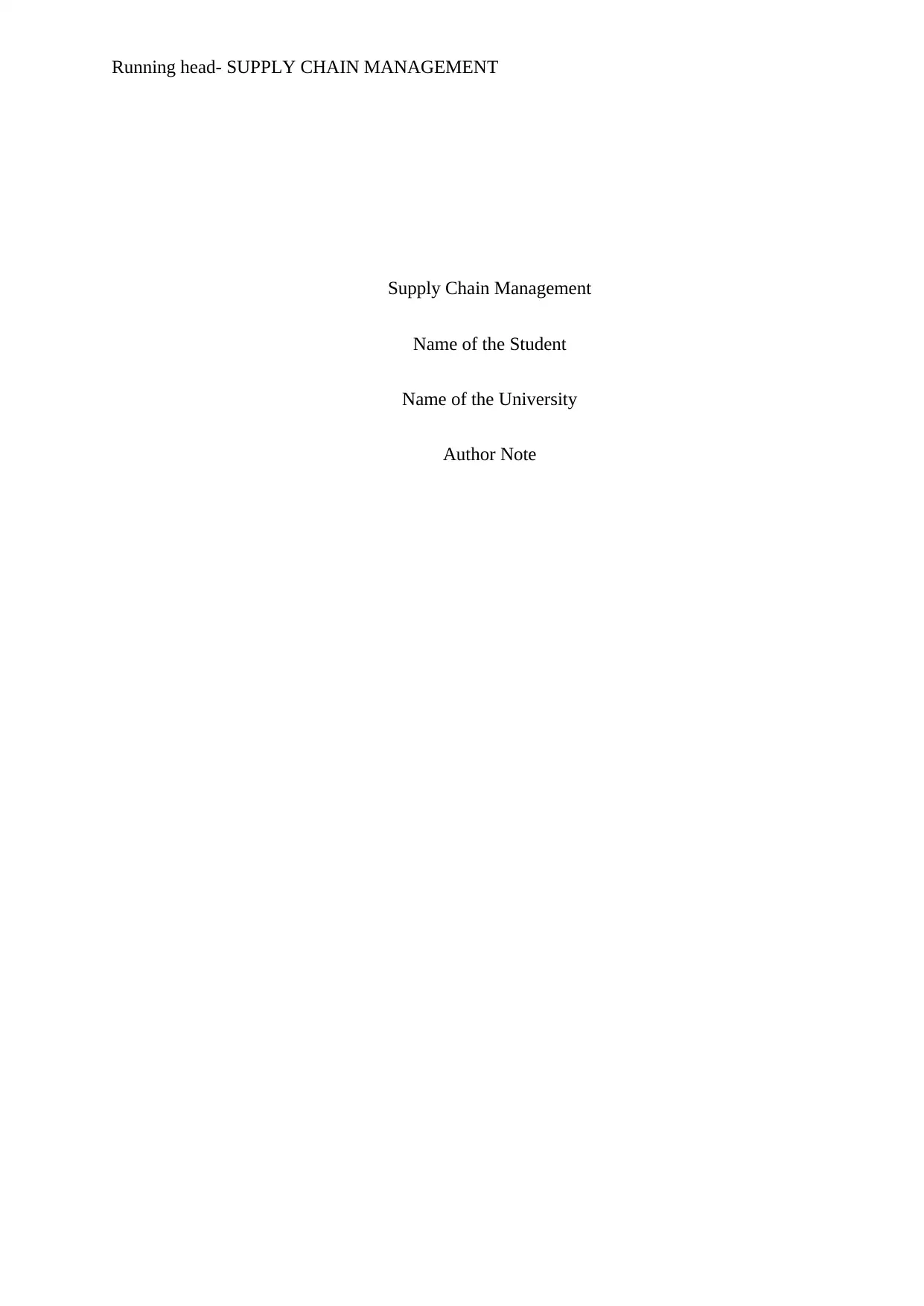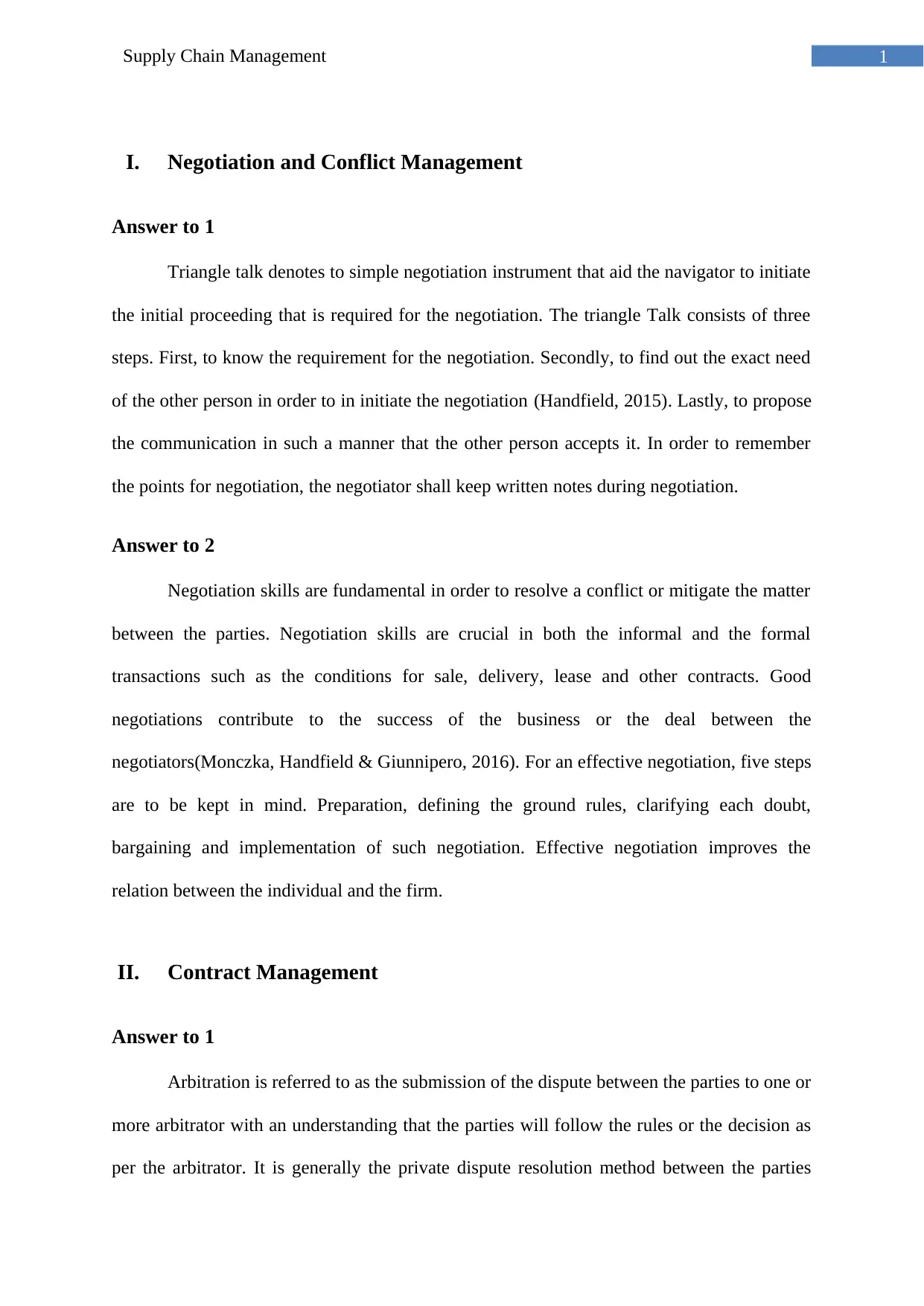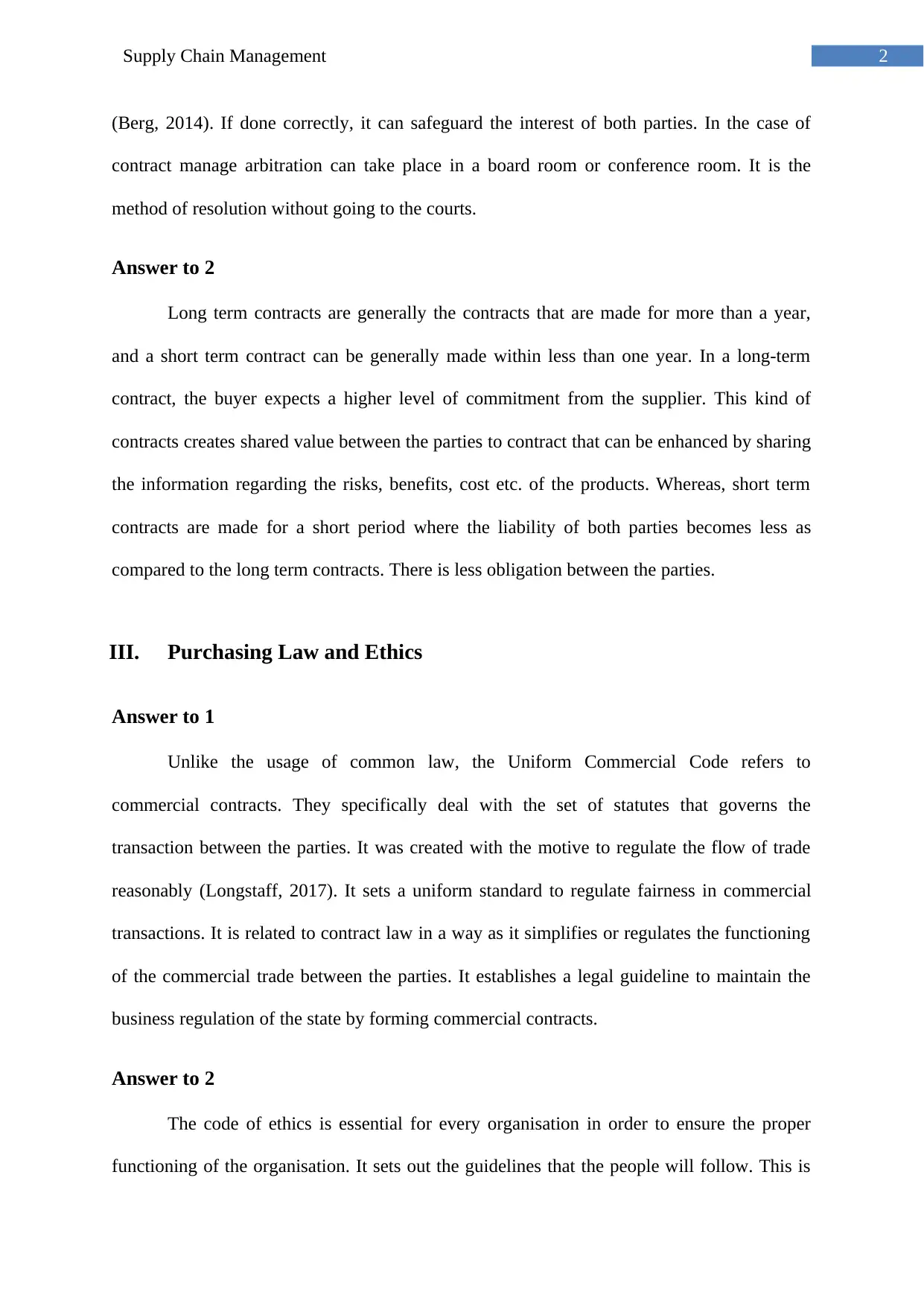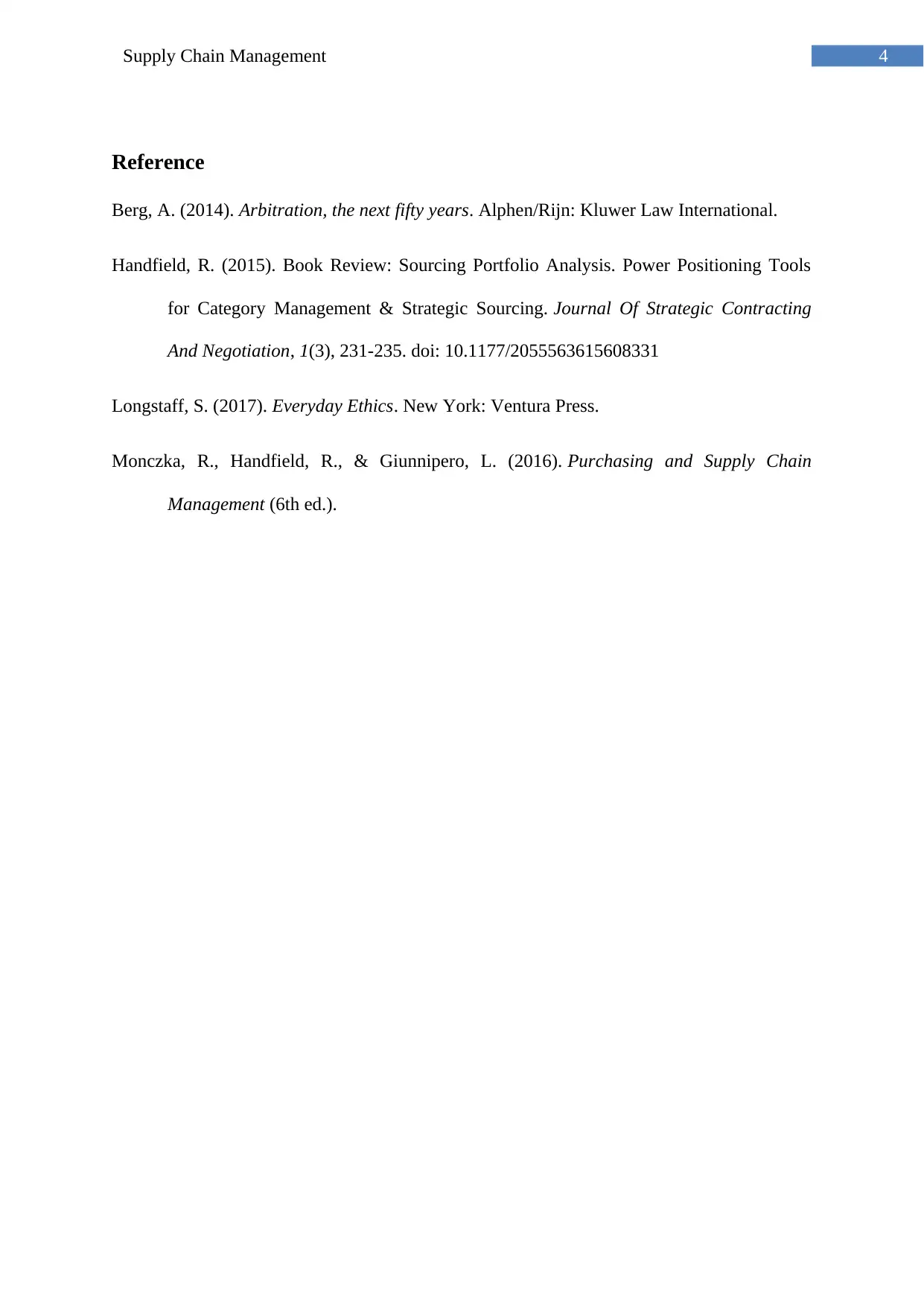Supply Chain Management: Negotiation, Contracts, and Ethics Analysis
VerifiedAdded on 2022/08/08
|6
|807
|24
Homework Assignment
AI Summary
This document presents solutions to a Supply Chain Management assignment, addressing key concepts from chapters 13-15 of the textbook. The assignment explores negotiation and conflict management, defining "Triangle Talk" and the importance of negotiation skills, including preparation, ground rules, clarification, bargaining, and implementation. It then delves into contract management, explaining arbitration and its venues, and differentiating between long-term and short-term contracts. Finally, the assignment examines purchasing law and ethics, clarifying the Uniform Commercial Code and its relationship to contract law, and emphasizing the significance of a written ethics policy within an organization. The solutions provided offer a comprehensive understanding of these crucial supply chain management topics.

Running head- SUPPLY CHAIN MANAGEMENT
Supply Chain Management
Name of the Student
Name of the University
Author Note
Supply Chain Management
Name of the Student
Name of the University
Author Note
Paraphrase This Document
Need a fresh take? Get an instant paraphrase of this document with our AI Paraphraser

1Supply Chain Management
I. Negotiation and Conflict Management
Answer to 1
Triangle talk denotes to simple negotiation instrument that aid the navigator to initiate
the initial proceeding that is required for the negotiation. The triangle Talk consists of three
steps. First, to know the requirement for the negotiation. Secondly, to find out the exact need
of the other person in order to in initiate the negotiation (Handfield, 2015). Lastly, to propose
the communication in such a manner that the other person accepts it. In order to remember
the points for negotiation, the negotiator shall keep written notes during negotiation.
Answer to 2
Negotiation skills are fundamental in order to resolve a conflict or mitigate the matter
between the parties. Negotiation skills are crucial in both the informal and the formal
transactions such as the conditions for sale, delivery, lease and other contracts. Good
negotiations contribute to the success of the business or the deal between the
negotiators(Monczka, Handfield & Giunnipero, 2016). For an effective negotiation, five steps
are to be kept in mind. Preparation, defining the ground rules, clarifying each doubt,
bargaining and implementation of such negotiation. Effective negotiation improves the
relation between the individual and the firm.
II. Contract Management
Answer to 1
Arbitration is referred to as the submission of the dispute between the parties to one or
more arbitrator with an understanding that the parties will follow the rules or the decision as
per the arbitrator. It is generally the private dispute resolution method between the parties
I. Negotiation and Conflict Management
Answer to 1
Triangle talk denotes to simple negotiation instrument that aid the navigator to initiate
the initial proceeding that is required for the negotiation. The triangle Talk consists of three
steps. First, to know the requirement for the negotiation. Secondly, to find out the exact need
of the other person in order to in initiate the negotiation (Handfield, 2015). Lastly, to propose
the communication in such a manner that the other person accepts it. In order to remember
the points for negotiation, the negotiator shall keep written notes during negotiation.
Answer to 2
Negotiation skills are fundamental in order to resolve a conflict or mitigate the matter
between the parties. Negotiation skills are crucial in both the informal and the formal
transactions such as the conditions for sale, delivery, lease and other contracts. Good
negotiations contribute to the success of the business or the deal between the
negotiators(Monczka, Handfield & Giunnipero, 2016). For an effective negotiation, five steps
are to be kept in mind. Preparation, defining the ground rules, clarifying each doubt,
bargaining and implementation of such negotiation. Effective negotiation improves the
relation between the individual and the firm.
II. Contract Management
Answer to 1
Arbitration is referred to as the submission of the dispute between the parties to one or
more arbitrator with an understanding that the parties will follow the rules or the decision as
per the arbitrator. It is generally the private dispute resolution method between the parties

2Supply Chain Management
(Berg, 2014). If done correctly, it can safeguard the interest of both parties. In the case of
contract manage arbitration can take place in a board room or conference room. It is the
method of resolution without going to the courts.
Answer to 2
Long term contracts are generally the contracts that are made for more than a year,
and a short term contract can be generally made within less than one year. In a long-term
contract, the buyer expects a higher level of commitment from the supplier. This kind of
contracts creates shared value between the parties to contract that can be enhanced by sharing
the information regarding the risks, benefits, cost etc. of the products. Whereas, short term
contracts are made for a short period where the liability of both parties becomes less as
compared to the long term contracts. There is less obligation between the parties.
III. Purchasing Law and Ethics
Answer to 1
Unlike the usage of common law, the Uniform Commercial Code refers to
commercial contracts. They specifically deal with the set of statutes that governs the
transaction between the parties. It was created with the motive to regulate the flow of trade
reasonably (Longstaff, 2017). It sets a uniform standard to regulate fairness in commercial
transactions. It is related to contract law in a way as it simplifies or regulates the functioning
of the commercial trade between the parties. It establishes a legal guideline to maintain the
business regulation of the state by forming commercial contracts.
Answer to 2
The code of ethics is essential for every organisation in order to ensure the proper
functioning of the organisation. It sets out the guidelines that the people will follow. This is
(Berg, 2014). If done correctly, it can safeguard the interest of both parties. In the case of
contract manage arbitration can take place in a board room or conference room. It is the
method of resolution without going to the courts.
Answer to 2
Long term contracts are generally the contracts that are made for more than a year,
and a short term contract can be generally made within less than one year. In a long-term
contract, the buyer expects a higher level of commitment from the supplier. This kind of
contracts creates shared value between the parties to contract that can be enhanced by sharing
the information regarding the risks, benefits, cost etc. of the products. Whereas, short term
contracts are made for a short period where the liability of both parties becomes less as
compared to the long term contracts. There is less obligation between the parties.
III. Purchasing Law and Ethics
Answer to 1
Unlike the usage of common law, the Uniform Commercial Code refers to
commercial contracts. They specifically deal with the set of statutes that governs the
transaction between the parties. It was created with the motive to regulate the flow of trade
reasonably (Longstaff, 2017). It sets a uniform standard to regulate fairness in commercial
transactions. It is related to contract law in a way as it simplifies or regulates the functioning
of the commercial trade between the parties. It establishes a legal guideline to maintain the
business regulation of the state by forming commercial contracts.
Answer to 2
The code of ethics is essential for every organisation in order to ensure the proper
functioning of the organisation. It sets out the guidelines that the people will follow. This is
⊘ This is a preview!⊘
Do you want full access?
Subscribe today to unlock all pages.

Trusted by 1+ million students worldwide

3Supply Chain Management
depended upon the morality and ethical nature of a person. Written ethics is essential as it is
the guidelines that the people follow and following them, it will be easy for the proper
implementation of the laid rules. The guidelines should be such that it should not hamper the
ethnicity of the organisation. Implementing the guideline that is in written or codified form
becomes easy. As such ethics are the key to the proper functioning of the organisation.
depended upon the morality and ethical nature of a person. Written ethics is essential as it is
the guidelines that the people follow and following them, it will be easy for the proper
implementation of the laid rules. The guidelines should be such that it should not hamper the
ethnicity of the organisation. Implementing the guideline that is in written or codified form
becomes easy. As such ethics are the key to the proper functioning of the organisation.
Paraphrase This Document
Need a fresh take? Get an instant paraphrase of this document with our AI Paraphraser

4Supply Chain Management
Reference
Berg, A. (2014). Arbitration, the next fifty years. Alphen/Rijn: Kluwer Law International.
Handfield, R. (2015). Book Review: Sourcing Portfolio Analysis. Power Positioning Tools
for Category Management & Strategic Sourcing. Journal Of Strategic Contracting
And Negotiation, 1(3), 231-235. doi: 10.1177/2055563615608331
Longstaff, S. (2017). Everyday Ethics. New York: Ventura Press.
Monczka, R., Handfield, R., & Giunnipero, L. (2016). Purchasing and Supply Chain
Management (6th ed.).
Reference
Berg, A. (2014). Arbitration, the next fifty years. Alphen/Rijn: Kluwer Law International.
Handfield, R. (2015). Book Review: Sourcing Portfolio Analysis. Power Positioning Tools
for Category Management & Strategic Sourcing. Journal Of Strategic Contracting
And Negotiation, 1(3), 231-235. doi: 10.1177/2055563615608331
Longstaff, S. (2017). Everyday Ethics. New York: Ventura Press.
Monczka, R., Handfield, R., & Giunnipero, L. (2016). Purchasing and Supply Chain
Management (6th ed.).

5Supply Chain Management
⊘ This is a preview!⊘
Do you want full access?
Subscribe today to unlock all pages.

Trusted by 1+ million students worldwide
1 out of 6
Related Documents
Your All-in-One AI-Powered Toolkit for Academic Success.
+13062052269
info@desklib.com
Available 24*7 on WhatsApp / Email
![[object Object]](/_next/static/media/star-bottom.7253800d.svg)
Unlock your academic potential
Copyright © 2020–2026 A2Z Services. All Rights Reserved. Developed and managed by ZUCOL.





